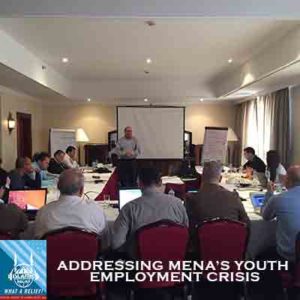 B.C. Dodge & R. Mordant Mahon to Taleb Salhab and Saro Nakashian in this episode of “What a Relief!” — IRUSA’s official podcast.
B.C. Dodge & R. Mordant Mahon to Taleb Salhab and Saro Nakashian in this episode of “What a Relief!” — IRUSA’s official podcast.
In this episode, B.C. & Mordant chat with Taleb Salhab and Saro Nakashian from Education for Employment. The organization started in 2006 in Gaza and now spans eight countries with a mission of creating job opportunities for unemployed youth in the Middle East and North Africa. By providing world-class professional and technical training, they have placed over 10,500 youth in jobs to date.
“We measure our success by our job outcomes,” Talib says, citing underemployment as a serious problem in the region. “Underemployment is when people are working jobs that are basically not paying them a living wage,” he explains. “They are not able to earn a living and they are not able to support themselves or their families.”
In addition to underemployment, youth are facing a skills mismatch in which the skills they are being taught are not in sync with what the workforce is seeking. Currently, unemployment rates have skyrocketed higher than high school drop out rates.
The organization partners with Islamic Relief USA to offer intensive programs which “skill them up.” Before the program, the youth barely know how to begin navigating the dreadful search for employment. Through Education for Employment, they are given the jumpstart and guidance they need to succeed. “Once they are able to start working, then they become upwardly mobile and they are able to continue in the workforce,” Talib says.
The program also boasts a statistic that is revolutionary for the region: it places more women into jobs than men.
“We feel we have a special responsibility in communities where it’s a challenge for women to access jobs,” he says. “They have the same challenges of skills gaps, but in addition to that there are other social and cultural barriers for female employment.”
Tune in to hear more groundbreaking achievements from this organization and why its contributions are so critical in the MENA region.
“I have the opportunity to attend graduation ceremonies around the country and it’s unquestionably the best part of my job,” Talib says. “You can feel the impact immediately. A two or three-month intervention can literally transform someone’s life.”
“It’s critically important for us to invest in the young people,” Saro adds. “These are the youth who are going to be the future of these countries, the future of these economies.”
“We can help them by giving them a little bit of hope. That is our role.”